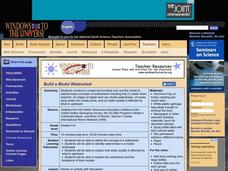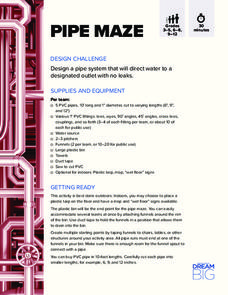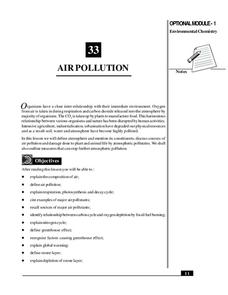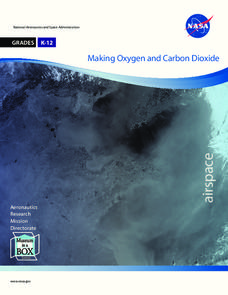Cornell University
Magnetic Mad Libs
Examine the science behind computer communication. After defining the properties of magnets, learners simulate how a computer hard drive works by sending each other binary codes using the magnets. They use these communications to...
Curated OER
Earth's Heavenly Treasures: Hummingbirds
Young ornithologists watch an informative video and use the Internet to gather data about the life, size, habitat, and migration of hummingbirds. The interdisciplinary lesson includes activities that target art, science, math, and...
Personal Genetics Education Project
How Does Ancestry Testing Work? Exploring Admixture Testing
Find out the science behind ancestry testing! Investigators watch a video exploring how ancestry works before participating in a hands-on group activity. Scholars role play scientists while learning about testing protocols and test...
Curated OER
Wheel of Trouble
While teaching about endangered species, you can incorporate this activity as a take-home reminder of what is threatening the sea turtle population. It is one of those paper plate projects in which a wedge is cut out to reveal a picture...
Olomana School
Mixtures and Solutions: Paper Chromatography Experiment
Why does some ink bleed through paper, and other ink doesn't? Practice some paper chromatography to separate the colors from a pen with an interactive experiment for middle and high schoolers. Learners use a variety of solutions to track...
Curated OER
Build a Model Watershed
Collaborative earth science groups create a working model of a watershed. Once it has been developed, you come along and introduce a change in land use, impacting the quality of water throughout their watershed. Model making is an...
It's About Time
Why Air Bags?
If a heavy steel car can't protect you from injury, how can a bag filled with air? The lesson answers this question and many others as young scientists experiment with the impulse and forces related to air bags in automobiles.
Curated OER
Unit 2: Global to Local: Understanding My Place in the Hydrosphere
What does the ground around your home have to do with water pollution? Young ecologists learn about their local watershed and create their own cause-and-effect models of the hydrosphere.
DiscoverE
Pipe Maze
Here's a lesson that is simply a-MAZE-ing! Introduce science scholars to pipeline systems through a hands-on project. Partnered pupils participate in the design, construct, and test a PVC pipeline maze. Reusable materials and clear...
Learning Games Lab
Bacteria Sampling
Scholars explore the procedure for bacteria sampling in a virtual lab by first walking through a detailed step-by-step procedure of preparing the samples of raw milk and pasteurized milk, growing the bacteria, and comparing results....
John Lentine
Butterflies and Bugs
Symmetry, line, shape, art, and math are all connected through a fun hands-on craft. Included are instructions to a classic activity, where learners create butterflies to show symmetry in nature and then discuss symmetry in math. It is...
National Security Agency
Time After Time
Save those precious minutes and hours spent planning math lessons with this mini-unit on telling time. Offering a series of engaging hands-on and collaborative learning activities, these three lessons teach children how to read...
Teach Engineering
Storing Android Accelerometer Data: App Design
There's an app for that! Pupils learn to build an app that will store data on an Android. The lesson introduces class members to the tiny database, TinyDB, for Android devices. A video tutorial provides an example that uses the...
Alachua County Public Schools
Food Chain
Two to four players receive seven cards each, with plants, animals, or nitrates depicted. They place what they have onto their own empty game board with the objective to complete a food chain. The game is a fun way to reinforce learning...
Pulitzer Center
Extractive Industries
Here is a chance for environmental studies classes to take a critical look at crises occurring around the globe by reading articles and viewing video clips. The human activities under scrutiny are the extraction of oil, logging, and...
National Institute of Open Schooling
Air Pollution
Seventy percent of the air pollution in China is due to car exhaust. Under the umbrella of environmental chemistry, learners extensively explore air pollution. From the makeup of our atmosphere to sources of major air pollutants, classes...
NOAA
Make Your Own Volcano!
Make a volcano erupt in your own classroom! Young scientists use household and craft materials to model and simulate the eruption of a volcano.
American Museum of Natural History
Buried Bones
Patience is the name of the game. Using Plaster of Paris and chicken bones, learners simulate an archeological dig site. They excavate the chicken bones over a period of several days using tools and a large amount of patience.
Purdue University
Global Design for the Seasons
People don't all get the same amount of sun at the same time of the year. Collaborative groups explore how the motion of Earth contributes to the idea in an inquiry-based STEM lesson. Learners first investigate how the rotation of Earth...
NASA
Making Oxygen and Carbon Dioxide
Some like it hot! Scholars observe both exothermic and endothermic reactions as part of the carbon dioxide oxygen cycle. First, scientists demonstrate (or watch) a chemical reaction to create pure oxygen using fire for...
Serendip
Diffusion and Cell Size and Shape
Is your class ready to size up the topic of diffusion? Help them get cell shape savvy with a well-written handout. The resource covers how substances such as oxygen passively move through the cell membrane and how cell size and shape...
College Board
AP® Psychology: Teaching Statistics and Research Methodology
Psychologists use statistics? Scholars investigate the research behind the methodology of statistical analysis. Using hands-on practice, case-studies, and scatterplots, they complete various tasks to understand the very roots of high...
DiscoverE
Design a Wind Turbine
Discover the power of wind energy. Learners design, build, and test wind blades in a hands-on experiment. They analyze the results to determine if they can make any improvements before gathering as a class to discuss their designs.
American Chemical Society
Liquids - Clearly Unique
Bring chemistry to life for scholars as they perform two tests to examine the unique properties of three liquids. Classroom investigators make observations, develop basic lab skills, and follow step-by-step instructions to compare water,...

























